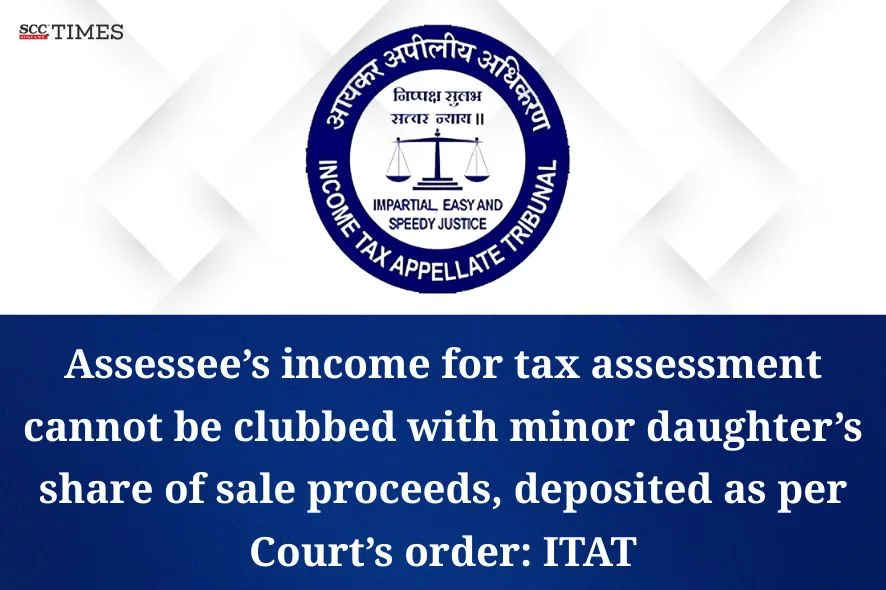Income Tax Appellate Tribunal: In the present appeal against the order of Commissioner of Income Tax (Appeals) (‘Commissioner’), whereby the Assessing Officer’s decision to club the income arising from the share of assessee’s minor daughter’s with the assessee’s income was upheld, S.S. Viswanethra Ravi, Judicial Member, allowed the appeal and stated that the assessee could not decide the utilization of his minor daughter’s share of sale proceeds, as it was deposited as per Court’s order and it is impossible to club the same with the assessee’s income. The Tribunal stated that the addition made in the income of the assessee with reference to assessee’s minor daughter’s share was not justified and thus, it was deleted. The Tribunal also deleted the disallowance of brokerage expenses, recognizing the standard industry practice and accepting the assessee’s explanation.
Background:
In the matter in hand, the assessee, inherited a property jointly with his minor daughter through his spouse after her death. The assessee sold the said property with the permission of City Civil Court, Chennai and as per direction, deposited 50% minor daughter’s share in the nationalized bank, that cannot be used until she attains majority, in the name of the Registrar, City Civil Court.
The assessee filed return of income declaring his total income, in response to the notice under section 148 of the Income Tax Act, 1961 (‘the Act’). The Assessing Officer asked the assessee to furnish details in support of the deduction claimed in the return of income. The Assessing Officer stated that the assessee had not declared income of his minor daughter on the received sale consideration. The assessee stated that he accounted his 50% share in the capital gains and claimed deduction under Section 54 of the Act by filing valuation report given by the Chartered Engineer and registered valuer. However, the Assessing Officer assessed that the income arising from the daughter’s share must be clubbed with the assessee’s income and accordingly made additions to the assessee’s total income.
The Assessing Officer determined capital gains with reference to assessee’s minor daughter’s share at 50% by giving benefit under section 54 of the Act only with reference to assessee’s share. The Commissioner upheld the additions to the assessee’s total income and thus, aggrieved by the same, present appeal has been filed.
Analysis, Law, and Decision:
The Tribunal observed that the only issue in the present case, was whether the assessee should have included the share of assessee’s minor daughter also in his income in offering long term capital gain. Admittedly, the said 50% share of assessee’s minor daughter was deposited in the name of Registrar, City Civil Court, Chennai under section 8(2) of Hindu Minority and Guardianship Act, 1956, the receipt of which reflected in the impugned order.
The Tribunal noted that on perusal of the order of the City Civil Court, Chennai, the assessee filed a petition seeking the Court’s permission to alienate property standing in the name of his deceased wife, to facilitate better education and welfare of their minor daughter. Considering the same, the City Civil Court permitted the assessee to sell his minor daughter’s interest in the property and deposit her share in any of the nationalized bank in the name of Registrar, City Civil Court.
The Tribunal stated that the assessee could not decide the utilization of his minor daughter’s share as it was deposited as per Court’s order and it is impossible to club the same with the assessee’s income. Therefore, the addition made in the hands of the assessee with reference to assessee’s minor daughter’s share was not justified and thus, it is deleted. Further regarding the brokerage charges, which is of 1% of the sale consideration, as it is usual practice across real estate sector, the Tribunal disallowed it for want of evidence, and thus, it is also deleted.
[Pradeep Jeyavelu v. CIT, 2025 SCC OnLine ITAT 9828, decided on 3-9-2025]
Advocates who appeared in this case:
For the Appellant: R.S. Hithesh, Advocate
For the Respondent: V. Aswathy, JCIT


